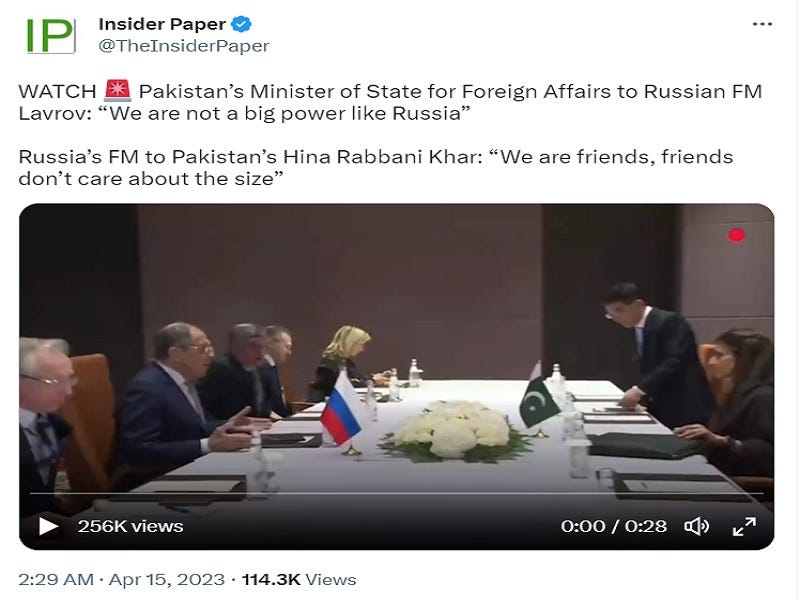The optics contradict Pakistan’s status as Afghanistan’s top stakeholder, which suggests that those who are formulating its foreign policy nowadays are flubbing everything very badly.
Observers took note of last week’s quick exchange between Russian Foreign Minister Sergey Lavrov and Pakistani Minister of State for Foreign Affairs Hina Rabbani Khar in Samarkand during their bilateral meeting on the sidelines of the larger summit being hosted there on Afghanistan. He asked her “Where’s the rest of your team?” as they got ready to begin after seeing that she was only accompanied by a single diplomat whereas he already had at least four others at the table by that time.
She responded by repeating “The rest of my team…?” before saying that “We have a small team, and the rest will come. We are travelling with a small team and we have a small embassy.” Khar then added that “We’re not a big power like Russia”, which can be interpreted either as banter or sass, thus prompting Lavrov to tell her “Don’t be too modest. We’re friends and friends do not care about the size, and after all, small is beautiful.” While some thought their exchange was amusing, it actually had a lot of meaning.
For starters, Islamabad dispatched Khar to the Samarkand meeting on Afghanistan instead of Foreign Minister Bilawal Bhutto Zardari (BBZ), while Russia, China, and Iran were all represented by their top diplomats. This naturally prompted Lavrov to indirectly inquire right at the start about where BBZ might be, but she either didn’t understand what he was implying or decided to deflect. Either way, Pakistan showed that it didn’t take this multilateral meeting as seriously as those three other countries did.
The second observation is how surprising this is considering that Pakistan is widely regarded as the most important stakeholder in Afghanistan’s stability, which is even more so nowadays when it’s confronted by a slew of terrorist threats emanating from that war-torn country. To send Khar instead of BBZ while the other three sent their Foreign Ministers suggests that Pakistan didn’t think that these talks were worth his time, which might have offended some of his counterparts who expected to meet him there.
Third, the lopsided representation between the Russian and Pakistani sides during their bilateral meeting also hints that Moscow is more interested in strengthening ties with Islamabad than the inverse otherwise the latter could have had more diplomats participate in their talks. Bilateral meetings on the sidelines of such multilateral events are common and usually planned in advance so this suggests that Pakistan deliberately snubbed Russia, albeit indirectly and thus with “plausible deniability”.
The final observation concerns Khar’s display of so-called “modesty”, which is arguably insincere. After all, her government’s cabinet is actually the largest in Pakistan’s history, so the innuendo that Islamabad couldn’t dispatch more diplomats to Samarkand due to austerity measures isn’t accurate. Pakistan isn’t a “big power” on the world stage like Russia is, but there’s no doubt that it’s a major player in the region and especially Afghanistan, hence why it was expected to take this meeting more seriously.
Altogether, the impression that one receives after reflecting on last week’s quick exchange between Lavrov and Khar is that she was unable to cogently explain why Pakistan didn’t dispatch its Foreign Minister to that event like Russia, China, and Iran did, nor why it didn’t send more diplomats either. The optics contradict her country’s status as Afghanistan’s top stakeholder, which suggests that those who are formulating its foreign policy nowadays are flubbing everything very badly.




